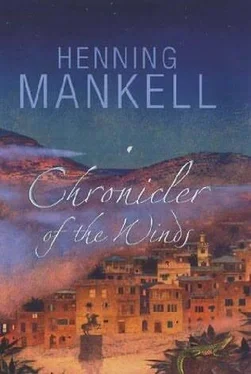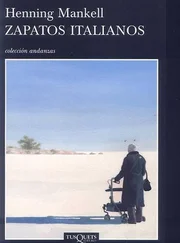I saw before me all the thousands upon thousands of people who, with clenched teeth, were holding on to the futile dream that today, in spite of everything, things might be a little better than the day that had just passed. At the same time I wanted them to stop for a moment and think: right now up on Dona Esmeralda's roof a boy lies dying.
I must have fallen asleep sitting there in the shade of the chimney. When I woke, it was late afternoon. I sat up with a start, at first not sure where I was. I had been dreaming about my father; he had been talking to me non-stop, but I couldn't recall a word that he said. Then I remembered what had happened, and I went over to the mattress where Nelio lay. He was asleep, his face was very pale, but his breathing was still steady and his forehead was cool. Since I was hungry, I went down to the little courtyard behind the bakery which is covered with a roof of woven palm leaves. That's where the bakers ate their meals, and the cook, Albano, still had some boiled rice and vegetables left, which he had served earlier in the day. After I filled my plate and began to eat, I realised that I was extremely hungry. In a few hours I would have to start work again; the night was going to be a long one, and I didn't know how long Senhora Muwulene's herbs would keep the fever down.
I had just finished eating and pushed my plate aside when Albano, who is big and fat and always stinks of home-made aftershave, sat down on the bench across from me, wiping the sweat from his brow with his grubby apron.
'The police have been here,' he said.
I held my breath. 'Why is that?'
Albano threw out his hands. 'Why do the police ever come?' he said. 'To ask questions, to snoop around, to kill time.'
I knew what he meant. Nobody had any faith in the police. They rarely solved a crime; their percentage of solved cases must have been almost zero. On the other hand, they eagerly accepted bribes, and everyone knew that they often allied themselves with thieves and took a share of the impounded goods before regretfully informing the robbery victims that, unfortunately, nothing had been recovered.
'Questions about what?' I said.
'Somebody heard shots in the night,' Albano said. 'Coming from here. From the bakery or the theatre. Did you hear anything?'
Albano is a friend. I like him, and not just because of the food he cooks. I could have told him the truth. I would have been grateful for somebody to share Nelio with. But I said nothing. I'm still not sure why. But I think it was because I sensed that Nelio wouldn't have wanted me to. When I carried him up to the roof, he talked about the silence and the peace, and I took that to mean that he wanted to be alone with his pain and those thoughts that only he knew.
'No, nothing,' I said. 'If anyone had fired a shot, I would have heard it.'
'That's what we told them, too,' Albano said.
'Did they believe you?'
'Who knows what the police believe? And who cares, anyway?'
To change the subject, I asked him to pack up a little of the leftover rice and vegetables in a piece of newspaper, so I would have something to eat during the night. I didn't know whether Nelio would be able to eat anything, but I thought that rice and vegetables would be better than bread. Albano did as I asked, and I left the bakery as the girls who sold bread were mopping the floor and wiping the shelves while the last customers bought the remaining loaves. I got things ready for the night and spoke to Julio, the boy who was my dough mixer, telling him how much flour to bring from the storeroom. Several hours later we were alone, and just before midnight Julio went home. I did the first baking. After I had put the baking pans into the ovens, I hurried up the winding staircase to the roof. Nelio was awake when I arrived.
It was on the second night that he began to tell his story.
Somewhere down on the street, behind a dilapidated building right next to the theatre, a woman was standing outside in the dark, pounding corn for the next day. As she pounded the grain with a heavy wooden pole, she sang. I sat next to Nelio, and we listened to her song and the sound of the pole, thudding regularly and tirelessly like a heart.
'Whenever I hear a pole pounding corn, I think about my mother,' Nelio said, and his voice sounded unexpectedly strong. 'I think about her and I wonder whether she's still alive.'
Then he told me about where he grew up and the gruesome events that had cast him out into a world he knew nothing about. He told me about the first time he ever saw the ocean, and about how he finally came to the city. He didn't tell me everything straight through. Now and then he would grow too tired, the fever would return, and he would sink down into darkness. But he always came back. It was as if he dived into the sea and vanished, eventually coming up to the surface again, but in a completely different place.
Just before dawn he managed to eat the rice and vegetables I had brought from Albano. Each time he lapsed into the fever I would go back to the ovens. Nelio seemed to have an agreement with the fire, because his periods of silence and fever always came when I needed to take out the baked bread and put new pans into the ovens.
That night he started telling me about his life – although I didn't yet realise how his story was going to change my own life.
He grew up in a village far beyond the great plains, in a long valley right below the high mountains which mark the border to the regions where the people speak different and to us incomprehensible languages, and where they also have strange customs. The village was not a big one. The huts were built of sun-dried clay with a pole in the middle to hold up the roof, which was made from woven reeds gathered in the river nearby, where crocodiles lurked below the surface and hippos bellowed in the night. He grew up with many brothers and sisters, with his mother Solange and his father Hermenegildo. That was a happy time; he couldn't remember that he ever had to go hungry to the mat where he slept at night and shared his blanket with several of his siblings. They always had corn or sorghum, and with his brothers and sisters he had learned where the bees hid their honey.
His father was gone for long periods of time. Nelio knew that Hermenegildo worked in the mines in a country far away, but he didn't know what mines were except that they were hollow pits stretching deep into the earth. Inside were glittering stones that white people paid his father to bring up. When he came home, he brought them presents and he always bought himself a new hat. For Nelio, his father's hat was the first sign that a world outside existed in which everything was different. He tried to imagine that he would some day experience the amazing moment of putting a hat on his head, a hat with a wide brim and a leather sweatband inside the crown.
His earliest memory was of his father lifting him high into the air to let him greet the sun. Whenever Hermenegildo was home, time would stand still and the world was complete. After he had set off again on one of the paths that wound along the river, off towards the high mountains where there was a road and maybe even a bus that would take him back to the mines, life would revert to the way it was before. So Nelio remembered his first years using two different measurements of time: a time and a life when his father was home, and an entirely different time when he was alone with his mother and siblings. When Nelio was five years old, he began tending the goats with the other boys; he had learned to shoot birds with a slingshot and to handle the complex stick-fighting duels that all boys in the village had to master. One time a leopard had appeared near the village, another time a lion was heard roaring in the distance. Every morning he woke to the sound of his mother standing outside the hut pounding corn with a pole that was so heavy he couldn't lift it. And she would sing as if she were taking strength from the tones that issued from her throat.
Читать дальше












